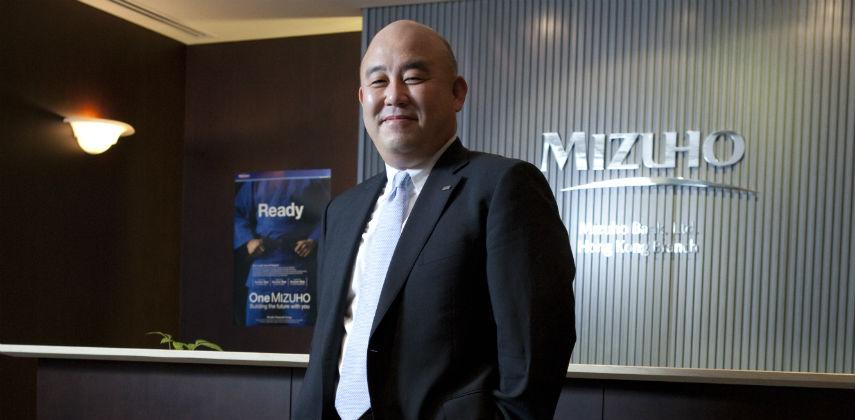Throughout his 25 years of service at Mizuho Bank, Masaomi Takada, general manager of Hong Kong Corporate Banking Division I, has had a wealth of experience in helping Japanese corporations to expand their business worldwide. “Our division is here to promote and maintain business relationships with Japanese corporations by providing them with various kinds of banking products like syndicated loans, trade finance, advisory service, loans, deposit and remittance, etc.,” he says.
Takada said many Japanese corporations are looking to expand to the mainland and the ASEAN countries. “We have a research department that provides advisory service for Japanese clients who want to explore their opportunities on the mainland and in ASEAN countries like Vietnam, Indonesia, Myanmar and many more. We provide them with the latest market news on the business environment and the most-up-to-date government policies and regulations regarding foreign investments in those countries,” he says.
Before Takada was relocated to Hong Kong in April this year, he also spent time in Singapore. “I find the two cities have a lot in common; both have many Japanese corporate regional headquarters. My job is to help Japanese clients expand their business in the 2 cities and to other parts of Asia. I am really pleased to be able to come to Hong Kong which is the centre of Asia. I have been here many times on business trips and I learned that the city is filled with energy and opportunities,” he says.
Heading a staff of 80, most of whom are local staff, Takada says it is not a must to be proficient in Japanese to join his division. “Knowing the language will be an advantage since we serve Japanese corporations, but it is not a must. There are only 14 expatriates in the division, the rest are locals and they perform very well. Many of our clients speak English and they also have local staff to help facilitate communication. When I was in Singapore, there were only 2 local staff who could speak Japanese, but we were still able to do business really well. So not knowing Japanese is not a cause for concern,” he says.
Takada stresses that capability is the key factor when he considers promoting staff. “Local people have many opportunities for promotion, whether they know Japanese or not. The key to success is to have an understanding about how the Japanese do business. Japanese people think building long-term relationships with clients is the most important. We don’t look at short-term returns. We always hope for long-term relationships with clients,” he says.
All the local staff play a key role in the division, and if they are capable, they will be given their own portfolio. For those with less experience, the bank is able to provide them with adequate training. “We provide different kinds of training for our staff to enhance their knowledge of banking products and business. Local staff with less experience can start in an assistant role. They will be assigned to work with experienced staff. Through this arrangement, we can groom our junior staff,” Takada says.
The bank is willing to invest in nurturing talent. “I was thankful for the bank sending me to study an MBA at the National University of Singapore. The company is very willing to invest in staff development; it sponsored many of my colleagues to study in Europe, the US and other places to help them enhance their careers,” Takada says.
Having to lead a team that consists of locals and Japanese, Takada emphasised the importance of good communication among colleagues. “Both local and Japanese staff can work well together; we have regular departmental meetings where supervisors and staff can have open discussions about work. We treasure harmony and team work in the workplace.”
While Japanese companies are known for their extended working hours, Takada says Mizuho aims to ensure a fair work-life balance for staff. “I never think long working hours means efficiency. We don’t encourage staff to stay late. We trust that work-life balance is able to enhance one’s physical and mental health as well as their performance,” says Takada.
He added that the bank has given staff the freedom of flexible working hours. “Staff can take their kids to school and then return to work outside the official working hours,” says Takada.


